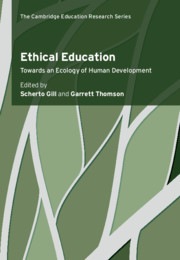General Introduction
Published online by Cambridge University Press: 30 June 2020
Summary
The Introduction challenges three limited approaches to ethical education, that is, the teaching of moral values as a subject matter, as the fostering of cognitive moral reasoning, or as the cultivation of virtues or character traits. We argue that ethics does not consist solely in informational propositional knowledge, but instead, it requires cultivating sensitivities that constitute caring in a relationship; ethics is rooted more deeply in the social and emotional aspects of human relationships than in the cognitive reasoning of moral principles, which will not awaken the need nor enliven the ability to appreciate the differences in others; ethics cannot be reduced to a list of virtues. We further argue that these three approaches are limited not only in their capacity to enable young people to overcome challenges in relationships with and feeling for others, but also in these being situated within an instrumentalised conception of education. This conception tends to ignore the importance of living human relationships within a school community as intrinsically valuable, hence missing out a core ingredient in ethics. To overcome these limitations, this book proposes that ethics should be understood primarily in terms of engaging with others in human relationships that consist in caring and mutual appreciation.
Keywords
Information
- Type
- Chapter
- Information
- Ethical EducationTowards an Ecology of Human Development, pp. 1 - 8Publisher: Cambridge University PressPrint publication year: 2020
